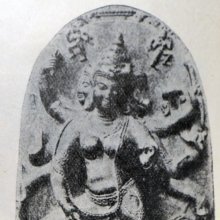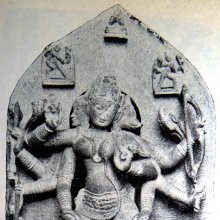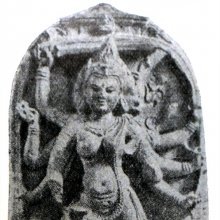Mish, Miś, Miṣ: 10 definitions
Introduction:
Mish means something in Hinduism, Sanskrit, Hindi. If you want to know the exact meaning, history, etymology or English translation of this term then check out the descriptions on this page. Add your comment or reference to a book if you want to contribute to this summary article.
The Sanskrit terms Miś and Miṣ can be transliterated into English as Mis or Mish, using the IAST transliteration scheme (?).
Images (photo gallery)
Languages of India and abroad
Sanskrit dictionary
Source: DDSA: The practical Sanskrit-English dictionaryMiś (मिश्).—1 P. (meśati)
1) To make a sound or noise.
2) To be angry.
--- OR ---
Miṣ (मिष्).—I. 6 P. (miṣati)
1) To open the eyes, wink.
2) To look at, look helplessly; जातवेदोमुखान्मायी मिषता- माच्छिनत्ति नः (jātavedomukhānmāyī miṣatā- mācchinatti naḥ) Kumārasambhava 2.46; येनार्घ्यं नृपमण्डलस्य मिषतो भीष्माग्रहस्ताद् धृतम् (yenārghyaṃ nṛpamaṇḍalasya miṣato bhīṣmāgrahastād dhṛtam) Dūtavākyam 1.41.
3) To rival, contend, emulate -II. 1 P. (meṣati) To wet, moisten, sprinkle.
Source: Cologne Digital Sanskrit Dictionaries: Shabda-Sagara Sanskrit-English DictionaryMiś (मिश्).—r. 1st cl. (meśati) 1. To sound. 2. To be angry.
--- OR ---
Miṣ (मिष्).—[(u) miṣu] r. 1st cl. (meṣati) To sprinkle. r. 6th cl. (miṣati) 1. To contend with, to emulate, to contest. 2. To look at or on. With ud 1. To open the eyes. 2. To blossom. 3. To shine. With ni To shut the eyes.
Source: Cologne Digital Sanskrit Dictionaries: Benfey Sanskrit-English DictionaryMiś (मिश्).—see maś.
--- OR ---
Miṣ (मिष्).— (probably for mikṣ, and akin to mih), i. 1, [Parasmaipada.] To sprinkle. Ptcple. of the pf. pass. miṣṭa. 1. Sprinkled. 2. Sweet, [Pañcatantra] 119, 7. n. A fine dish, Böhtl. Ind. Spr. 1787; sweetmeat.
--- OR ---
Miṣ (मिष्).—i. 6, [Parasmaipada.] (properly To wink, to contract the eyelids, cf. mīl, kṣmīl, śmīl, smīl, and smi). 1. To look at angrily,
— With the prep. ud ud, 1. To open one’s eyes, [Bhagavadgītā, (ed. Schlegel.)] 5, 9; [Kumārasaṃbhava, (ed. Stenzler.)] 5, 25. 2. To flash, [Daśakumāracarita] in
— With pratyud prati-ud, To break forth, [Daśakumāracarita] in
— With ni ni, To shut one’s eyes, to wink, Mahābhārata 3, 10649.
— Cf. [Latin] miser; probably also cf. [Latin] micare.
--- OR ---
Mis (मिस्).—i. 4, [Parasmaipada.] To go.
Source: Cologne Digital Sanskrit Dictionaries: Cappeller Sanskrit-English DictionaryMiṣ (मिष्).—miṣati (miṣate) open the eyes, look, behold (only the [present] [participle] miṣant, [especially] in constructions as miṣato bandhuvargasya before the eyes of the friends).
Source: Cologne Digital Sanskrit Dictionaries: Monier-Williams Sanskrit-English Dictionary1) Miś (मिश्):—(cf. √maś, and 1. mikṣ) [class] 1. [Parasmaipada] meśati, to sound or to be angry, [Dhātupāṭha xvii, 74.]
2) Miṣ (मिष्):—1. miṣ [class] 6. [Parasmaipada] ([Dhātupāṭha xxviii, 60]) miṣati (of the simple verb only [present participle] miṣat; in [grammar] also [perfect tense] mimeṣa; [Aorist] ameṣīt; [future] meṣitā, meṣiṣyati etc.; cf. unand ni√miṣ),
2) —to open the eyes, wink, blink, [Ṛg-veda] etc. etc. (generally used in [genitive case] = before the eyes of, in presence of, in spite of e.g. miṣato bandhu-vargasya, the whole number of friends looking on id est. before their very eyes, in spite of them);
2) —to rival, emulate (spardhāyām), [Dhātupāṭha]
3) 2. miṣ [class] 1. [Parasmaipada] meṣati, to sprinkle, moisten, wet, [Dhātupāṭha xvii, 48.]
4) Mis (मिस्):—[class] 4. [Parasmaipada] misyati to go, [Naighaṇṭuka, commented on by Yāska ii, 14.]
Source: Cologne Digital Sanskrit Dictionaries: Yates Sanskrit-English Dictionary1) Miś (मिश्):—bheśati 1. a. To sound; to be angry.
2) Miṣ (मिष्):—meṣati 1. a. To sprinkle. (śa) miṣati 6. a. To emulate, dispute.
Source: DDSA: Paia-sadda-mahannavo; a comprehensive Prakrit Hindi dictionary (S)Mis (मिस्) in the Sanskrit language is related to the Prakrit word: Misa.
[Sanskrit to German]
Sanskrit, also spelled संस्कृतम् (saṃskṛtam), is an ancient language of India commonly seen as the grandmother of the Indo-European language family (even English!). Closely allied with Prakrit and Pali, Sanskrit is more exhaustive in both grammar and terms and has the most extensive collection of literature in the world, greatly surpassing its sister-languages Greek and Latin.
Hindi dictionary
Source: DDSA: A practical Hindi-English dictionaryMis in Hindi refers in English to:—(nm) a pretext, pretence, excuse..—mis (मिस) is alternatively transliterated as Misa.
...
See also (Relevant definitions)
Starts with (+124): Misha, Mishadhanya, Mishala, Mishamishay, Mishamishaya, Mishamishayate, Mishamitita, Mishamlita, Mishan, Mishana, Mishannu, Mishara, Misharuka, Mishat, Mishi, Mishi quiro, Mishika, Mishikri, Mishinnu, Mishisalai.
Ends with: Amish, Animish, Aramish, Gilgamish, Kishmish, Nimish, Niramish, Pratyumish, Samish, Samumish, Udmish, Unmish.
Full-text (+129): Misha, Nimish, Vinimesha, Unmesha, Unmeshana, Unmisha, Unmish, Memisha, Kapatashraya, Mishta, Kalameshika, Nimisa, Unmishita, Mis-mis, Bhanudatta, Pratyumish, Bahattara-khodi, Mishla, Mesha, Nimisati.
Relevant text
Search found 54 books and stories containing Mish, Miś, Mis, Miṣ; (plurals include: Mishes, Miśs, Mises, Miṣs). You can also click to the full overview containing English textual excerpts. Below are direct links for the most relevant articles:
Mandukya Upanishad (Gaudapa Karika and Shankara Bhashya) (by Swami Nikhilananda)
Mandukya Karika, verse 1.11 < [Chapter I - Agama Prakarana (Scripture)]
Mandukya Karika, verse 1.12 < [Chapter I - Agama Prakarana (Scripture)]
Mandukya Karika, verse 1.14 < [Chapter I - Agama Prakarana (Scripture)]
Manusmriti with the Commentary of Medhatithi (by Ganganatha Jha)
Verse 5.15 < [Section II - Objectionable Food]
Verse 4.170 < [Section XIV - Other Duties]
Verse 9.246-247 < [Section XXXIII - Disposal of the Fine realised from the Worst Offenders]
The Bhikkhus Rules (by Bhikkhu Ariyesako)
Bhikkhus And Wealth < [Chapter 3 - Possessions And Offerings]
Vastu-shastra (5): Temple Architecture (by D. N. Shukla)
Jnaneshwari (Bhavartha Dipika) (by Ramchandra Keshav Bhagwat)
Verse 4.17 < [Chapter 4 - Brahma-yajna]
Verse 11.44 < [Chapter 11 - Vishvarupa-darshana-yoga]
Tiruvaymoli (Thiruvaimozhi): English translation (by S. Satyamurthi Ayyangar)
Pasuram 5.9.10 < [Section 9 - Ninth Tiruvaymoli (Man ey nokku)]
Pasuram 4.6.10 < [Section 6 - Sixth Tiruvaymoli (Tirpparai yam ini)]
Pasuram 3.9.5 < [Section 9 - Ninth Tiruvaymoli (Connal Virotam)]



